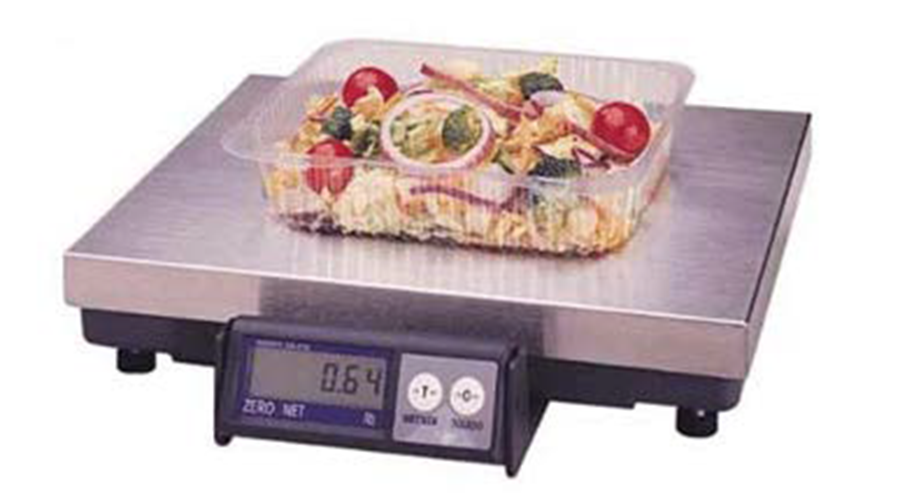Scales
Core Product: Aloha Quick Service, Aloha Table Service
Complimentary Products: No
Separate License Required? No
Other References: Aloha Quick Service Reference Guide, Aloha Quick Service Report Guide, Aloha Quick Service Screen Designer Guide, Aloha Table Service Reference Guide, Aloha Table Service Report Guide, Aloha Table Service Screen Designer Guide
View/Download/Print: Scales Feature Focus Guide - HKS1480
About Scales
Scales enhance the Aloha® Point-of-Sale (POS) system by allowing you to calculate the price of a menu item, such as a salad, based on its weight. Tares allow you to subtract the weight of the container in which you place the item to weigh it, to determine the true weight of the item. The picture below shows an example of one of the supported scales, Mettler Toledo 8217, weighing an item, with a plastic container used as a tare.

The Aloha POS system currently supports scales by three manufacturers, Mettler Toledo (8217 and 8213), NCI (6702, 6710, and 6720), and CAS PDI (using a Mettler Toledo 8213 emulation). Aloha also supports the Brazilian Toledo Prix III scale.
For sites in the United States, it is a requirement of the National Conference of Weights and Measures (NCWM) that POS systems interfacing with scales be compliant with the standards set forth by the National Type Evaluation Program (NTEP). The NTEP program was established in 1984 by a task force of weights and measures officials, as well as manufacturers and users of weighing devices. The purpose of this program is to govern a set of requirements for evaluating commercial weighing and measuring devices before they are sold. Failure to abide by these regulations could result in penalties and the removal of the scale from the workplace. Being compliant is not mandatory for International locations.
Some of the requirements impact how you interact with the scale, others affect the Aloha POS configuration of the scale, and the remaining requirements are “behind the scenes” with no visible impact to you.
The main requirements for the Aloha POS system to be compliant with NTEP standards are:
- You must install Aloha Table Service or Aloha Quick Service v6.2.14, or higher.
- Both the POS software and the commercial scale with which it interfaces must be NTEP certified.
- The POS system must do the following:
- Reset the scale to zero after each item is weighed, and cannot allow negative or over-capacity weights to be recorded.
- Subtract the weight of the container in which the item is placed to determine the true weight of the item.
- Prevent the weight from being recorded until the motion of the scale is stabilized.
- Round the price calculation for weighted items to the nearest cent, including items that are split- priced.
- The NTEP identification must be visible from the Aloha POS system’s initialization screen (Aloha Front-of-House (FOH) Floating Logo screen), and you must also be able to easily access the NTEP identification when the - -POS terminal is operational by pressing a ‘Help’ button on the POS main order entry screen.
- The guest check/receipt must clearly indicate when a weight is entered manually, the total weight, the unit price, and the total price of the weighted item.
- The local currency must precede the total on the guest check.
Note: Per the NTEP requirements, you must display the currency symbol on the guest check when you use a scale. By default, the Aloha POS system uses the United States ‘$’ sign, which is in accordance with NTEP regulations; however, if you are in the United States and use a different base currency, you must use configure a foreign currency. Currently in the system, the only way to accomplish this is to create a foreign currency record in Foreign Currency Maintenance.
Configuring Scales
- Defining the serial port settings and pin-outs for scales
- Exposing configuration options for scales
- Configuring scale device
- Defining a tare
- Configuring an item to use quantity pricing
- Displaying scale certification on FOH floating logo
- Providing access to scale certification information
- Defining text to indicate net and manual weight entry
- Refreshing POS data
Using Scales
Learn how to use scales to price an item by weight.
Troubleshooting Scales
Learn possible solutions to problems you may encounter with scales.
Appendix: Supporting a non-integrated scale
Learn possible solutions for supporting non-integrated scales.